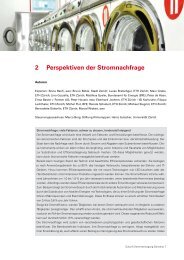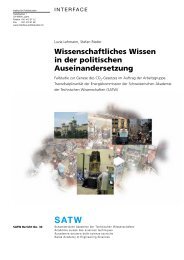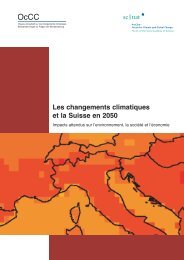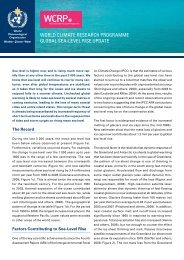Climate Change and Switzerland 2050 - OcCC - SCNAT
Climate Change and Switzerland 2050 - OcCC - SCNAT
Climate Change and Switzerland 2050 - OcCC - SCNAT
Create successful ePaper yourself
Turn your PDF publications into a flip-book with our unique Google optimized e-Paper software.
<strong>Climate</strong> <strong>Change</strong> <strong>and</strong> Switzerl<strong>and</strong> <strong>2050</strong> | Synthesis 163<br />
Relative emissions (base 1990 – 100%)<br />
160%<br />
140%<br />
120%<br />
100%<br />
80%<br />
60%<br />
40%<br />
20%<br />
Global greenhouse gas emissions<br />
0%<br />
1990 2000 2010 2020<br />
Year<br />
2030 2040 <strong>2050</strong><br />
world regions where climate damages may be<br />
critical. Secondly, our country will be affected<br />
as part of the global economic system, which<br />
could suffer considerable damage through climate<br />
change. International studies (e.g. Stern<br />
review, 2006)7 estimate the economic damage<br />
due to climate change at 3-20% of the global<br />
GNP by 2100. Damage of such an extent would<br />
destabilise the global economic system. This<br />
would probably also lead to considerable social<br />
upheavals, massive population movements <strong>and</strong><br />
global political conflicts (among others about<br />
water), which might well also gravely affect the<br />
Swiss economy.<br />
The only long-term way of limiting the extent<br />
of climate-induced consequences consists of<br />
combating climate change as the cause. In this<br />
regard, the international community is attempting<br />
a first step towards a more climate-friendly<br />
future with the Kyoto protocol. However, it has<br />
always been clear <strong>and</strong> is now quite evident that<br />
these efforts will fall short. Global emissions<br />
are currently increasing by 3.2% per year <strong>and</strong><br />
are developing according to scenario A1 (fig. 1,<br />
target<br />
5-year delay<br />
10-year delay<br />
Figure 2: In order to stabilise the global temperature at +2 °C (by 2100), a reduction of global greenhouse gas emissions by<br />
50% (based on 1990 levels) will be required by <strong>2050</strong>. This dem<strong>and</strong>s immediate action. A delay in taking reduction measures will<br />
require a greater <strong>and</strong> more rapid reduction of emissions in order to reach the target. Thus, annual reduction rates will have to<br />
be increased by about 1% for every 5 years of delayed reduction measures.<br />
Source: Modified from Meinhausen et al. 5 <strong>and</strong> Elzen & Meinhausen 6 )<br />
fossil energy mix). Unfortunately, there are few<br />
signs of a comprehensive turnaround towards<br />
an improvement in climate change policy. This<br />
is, however, urgently required, if a stabilisation<br />
target in accordance with the UN climate<br />
convention of 1992, which aims to prevent<br />
dangerous anthropogenic disturbances of the<br />
climate system, is to be attained. The earlier<br />
action is taken, the smaller the effects on the<br />
climate system <strong>and</strong> the global economy can<br />
be expected to become. However, if emissionreducing<br />
measures are delayed, then the reductions<br />
required will have to be achieved within<br />
a shorter time. Additionally, massive damage<br />
will have to be compensated. This can become<br />
an unsolvable task, since the economy would<br />
have to change over to low-emission production<br />
in a very short time. This fact is clearly<br />
shown in figure 2.<br />
Therefore, hope remains that on a national as<br />
well as on an international level, the decision<br />
makers in politics <strong>and</strong> the economy will recognise<br />
the full extent of the problem <strong>and</strong> manage<br />
to decide on a concerted, consistent course of

















